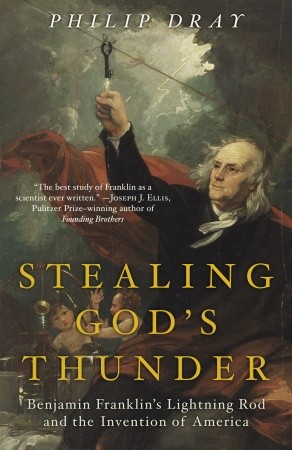
Stealing God's Thunder
Benjamin Franklin's Lightning Rod and the Invention of America
کتاب های مرتبط
- اطلاعات
- نقد و بررسی
- دیدگاه کاربران
نقد و بررسی

Starred review from May 23, 2005
Ben Franklin's invention of the lightning rod and his revelation of the mysterious workings of lightning and thunder made him one of the foremost scientists of his day. As Dray, who won the Robert F. Kennedy Memorial Book Prize for At the Hands of Persons Unknown: The Lynching of Black America,
points out in this lively and entertaining tale, Franklin made his reputation as a scientist long before he established himself as a statesman. He began his experiments with electricity in the mid–18th century, when numerous European scientists were similarly engaged. Franklin wondered whether the properties of lightning were the same as those of electricity. He established a rodlike device on a hill that attracted lightning from a passing thunderstorm and conducted the current away from houses and farms and into the ground. In 1751, Franklin published a widely popular book on his observations of electricity, which won him admiration throughout Europe. Dray elegantly observes that Franklin was the first to espouse an atomic theory of electricity, which he saw as an elemental force of nature contained in all objects. Dray provides not only a masterful glimpse of this aspect of Franklin's work but also a captivating cultural history of Franklin's America. B&w illus. Agent, Geri Thoma.

August 1, 2005
Casting Benjamin Franklin as the personification of the Enlightenment, Dray reviews the avuncular Founder's science and inventions, of which the lightning rod is merely the most famous. As background, the author offers the Boston of Puritan Cotton Mather, whom the young Franklin knew and lampooned in his early pamphleteering. The irony, Dray finds, is that the future rationalist was against one advance in progress--inoculation against smallpox--while Mather was for it. Fast-forwarding to the adult Franklin's withdrawal from business to pursue natural philosophy, after having made his fortune, Dray ruminates on Franklin's experiments with electricity, which justly enshrine his name as a great scientist, though Dray admits there is doubt about the veracity of the kite-in-the-thunderstorm experiment (an outright Franklin fraud, according to Tom Tucker's " Bolt of Fate," 2003). Tracing Franklin's beliefs through science, Dray's congenial history has information that will surprise even veteran Franklin fans.(Reprinted with permission of Booklist, copyright 2005, American Library Association.)

























دیدگاه کاربران